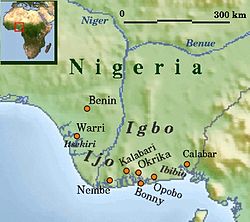Akwa Akpa
| Akwa Akpa | |
|---|---|
| City state | |

Picture of Old Calabar Factories from HM Stanley's book "The Congo and the founding of its free state; a story of work and exploration (1885)"
|
|
 Southeastern states, including Calabar |
|
| Coordinates: 4°57′N 8°19′E / 4.950°N 8.317°ECoordinates: 4°57′N 8°19′E / 4.950°N 8.317°E |
Akwa Akpa, known to European colonists as Old Calabar or Duke Town, was an Efik city-state that flourished in the 19th century in what is now southeastern Nigeria. Although it is now absorbed into Nigeria, traditional rulers of the state are still recognized. The state occupied what is now the modern city of Calabar.
The Efik are a subgroup of the Ibibio people. They speak a language in the Obolo subgroup of the Niger–Congo language group. They had become a power on the coast of the Bight of Benin by the early 18th century, by which time the Duke and Eyamba families were their leaders. They were settled in large, fortified villages along the waterways, in a loose federation with no paramount ruler, living by fishing and farming. The largest settlements were Ikot Itunko, Obutong and Iboku Atapka. In the 19th century, the British renamed these as Creek Town, Old Town and Duke Town.
The traditional Efik religion considers that Abasi created the universe. One tradition says that Abasi's wife Atai persuaded him to let two of their children, a daughter and son, settle on the earth. They were not allowed to breed, but disobeyed this injunction and became the ancestors of the Efik people. Another version says that Abasi created two people, and did not allow them to breed. When they disobeyed this order, in punishment Abasi let loose death on the earth.
The religion places importance on paying tribute to the village ancestors, particularly those who achieved high rank, since they can affect the fortunes of the living for good or bad. The earth deity Ala is appeased through the Ogbom ceremony, which makes children plentiful and increases the harvest.
Some Efik belong to the Ekpe secret society. They made detailed wood carvings, masks, and accouterments that are considered complex works of art. Efik sacred ceremonies include drumming and music as important elements.
The coast in this region was named "Calabar" by the Portuguese explorer Diogo Cao. His reason for choosing this name is unknown, since it was not used by the Efik people. The city of Akwa Akpa was founded by Efik families who had left Creek Town, further up the Calabar river, settling on the east bank in a position where they were able to dominate the slave trade with European vessels that anchored in the river. They soon became the most powerful people in the region. Akwa Akpa, also known as Duke Town to the British, became a center of the slave trade, where slaves were exchanged for European goods.
...
Wikipedia
